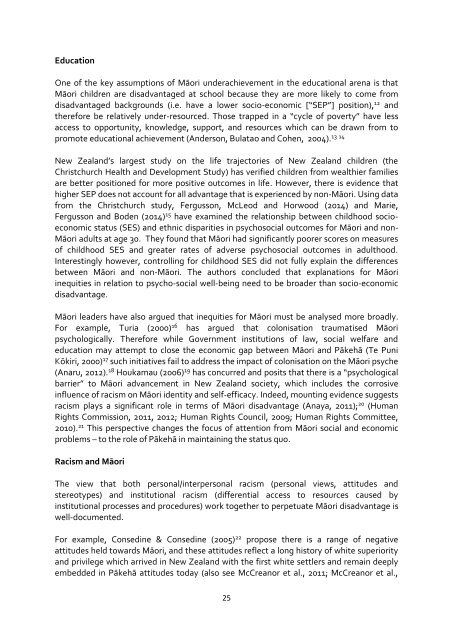UNCONSCIOUS BIAS AND EDUCATION
unconsious-bias-and-education
unconsious-bias-and-education
You also want an ePaper? Increase the reach of your titles
YUMPU automatically turns print PDFs into web optimized ePapers that Google loves.
Education<br />
One of the key assumptions of Māori underachievement in the educational arena is that<br />
Māori children are disadvantaged at school because they are more likely to come from<br />
disadvantaged backgrounds (i.e. have a lower socio-economic [“SEP”] position), 12 and<br />
therefore be relatively under-resourced. Those trapped in a “cycle of poverty” have less<br />
access to opportunity, knowledge, support, and resources which can be drawn from to<br />
promote educational achievement (Anderson, Bulatao and Cohen, 2004).<br />
13 14<br />
New Zealand’s largest study on the life trajectories of New Zealand children (the<br />
Christchurch Health and Development Study) has verified children from wealthier families<br />
are better positioned for more positive outcomes in life. However, there is evidence that<br />
higher SEP does not account for all advantage that is experienced by non-Māori. Using data<br />
from the Christchurch study, Fergusson, McLeod and Horwood (2014) and Marie,<br />
Fergusson and Boden (2014) 15 have examined the relationship between childhood socioeconomic<br />
status (SES) and ethnic disparities in psychosocial outcomes for Māori and non-<br />
Māori adults at age 30. They found that Māori had significantly poorer scores on measures<br />
of childhood SES and greater rates of adverse psychosocial outcomes in adulthood.<br />
Interestingly however, controlling for childhood SES did not fully explain the differences<br />
between Māori and non-Māori. The authors concluded that explanations for Māori<br />
inequities in relation to psycho-social well-being need to be broader than socio-economic<br />
disadvantage.<br />
Māori leaders have also argued that inequities for Māori must be analysed more broadly.<br />
For example, Turia (2000) 16 has argued that colonisation traumatised Māori<br />
psychologically. Therefore while Government institutions of law, social welfare and<br />
education may attempt to close the economic gap between Māori and Pākehā (Te Puni<br />
Kōkiri, 2000) 17 such initiatives fail to address the impact of colonisation on the Māori psyche<br />
(Anaru, 2012). 18 Houkamau (2006) 19 has concurred and posits that there is a “psychological<br />
barrier” to Māori advancement in New Zealand society, which includes the corrosive<br />
influence of racism on Māori identity and self-efficacy. Indeed, mounting evidence suggests<br />
racism plays a significant role in terms of Māori disadvantage (Anaya, 2011); 20 (Human<br />
Rights Commission, 2011, 2012; Human Rights Council, 2009; Human Rights Committee,<br />
2010). 21 This perspective changes the focus of attention from Māori social and economic<br />
problems – to the role of Pākehā in maintaining the status quo.<br />
Racism and Māori<br />
The view that both personal/interpersonal racism (personal views, attitudes and<br />
stereotypes) and institutional racism (differential access to resources caused by<br />
institutional processes and procedures) work together to perpetuate Māori disadvantage is<br />
well-documented.<br />
For example, Consedine & Consedine (2005) 22 propose there is a range of negative<br />
attitudes held towards Māori, and these attitudes reflect a long history of white superiority<br />
and privilege which arrived in New Zealand with the first white settlers and remain deeply<br />
embedded in Pākehā attitudes today (also see McCreanor et al., 2011; McCreanor et al.,<br />
25


